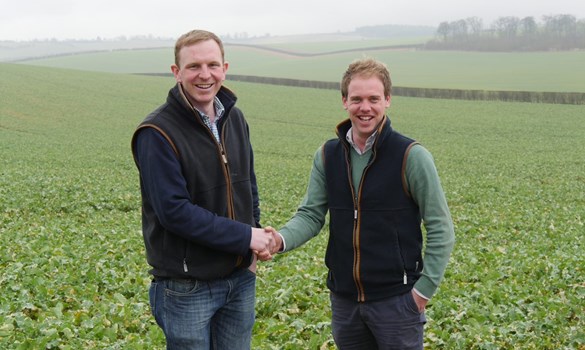Optimising plant nutrition: Duxford
Optimising plant nutrition
Duxford Monitor Farm meeting
Achieving full yield potential needs the correct balance of nutrients required by the plant. This session looks at how best to do that looking specifically at micronutrients with expert, Sarah Kendall, ADAS.
What are the deficiencies and symptoms that you are looking for? Are these best looked at through soil analysis, tissue testing or grain analysis? Is there an economic benefit from using a trace element? Are there other biological alternatives that can be used?
This Monitor Farm meeting will discuss these questions and give you the answers to look at for your crops.
Programme
- Registration with coffee and bacon roll
- Welcome and introduction: Teresa Meadows, AHDB
- Farm update: David Hurst and Tom Mead, Duxford Monitor Farmers
- Plant deficiencies: group discussion
- Optimising nutrition: Sarah Kendall, ADAS
- Micronutrients and trace elements
- Deficiencies and their symptoms
- Economic return
- Soil, tissue and grain testing
- YEN and grain nutrient benchmarking
- Refreshment break
- Putting the theory into practice: David Fuller-Shapcott, Sweethope Farm
- Season recommendations for MF Mead and Son and Law Farming: group discussion
- Meeting summary and close: Teresa Meadows, AHDB
- Depart
About Duxford Monitor Farm
Tom Mead and David Hurst are hosting the Duxford Monitor Farm together. They farm within nine miles of each other at the Hertfordshire/ Cambridgeshire border and their land is joined by the old Icknield Way. With different businesses but common goals and problems, the jointly-hosted Monitor Farm will provide an opportunity to look at collaboration, farm management and business resilience from two different perspectives.
Tom Mead is a partner at Bleak House Farm in Cambridgeshire. The family farm has 377ha of arable cropping, growing wheat, barley, oats and oilseed rape, as well as sugar beet. They use a mixture of ploughing and minimal tillage cultivation, aiming to cultivate as shallow as possible when the conditions allow. The farm has storage capacity for around 2,000 tonnes. Winter barley and OSR are generally sold at harvest and wheat and oats are stored longer and marketed between harvest and the following spring. Tom is a graduate of the Tesco Future Farmers programme and is particularly interested in running an efficient farm business on a small scale. He also wants to find ways to push the business forward, looking in detail at soils, how to stay profitable, focus on the customer and maintain a good work-life balance.
David Hurst is the arable manager at Law Farming in Hertfordshire. He manages 1,355ha of arable cropping including rye, wheat, barley, oats, spring barley, forage rape, spring mustard and sugar beet. The farm also has a 1,750 head sheep flock, rents land out for pigs and there are plans to introduce cattle back on to the farm. There are three full-time staff and a harvest student. The farm is ploughed for grass leys and winter and spring barley, but a one pass operation is used elsewhere. David’s ambition for the business in the short term is to continue to reduce fixed and variable costs, without affecting productivity or the quality or value of output. During the Monitor Farm programme, David is looking forward to learning from other farmers and wider industries across the supply chain.
For more information please visit the Duxford Monitor Farm page


